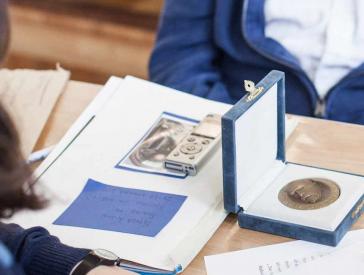The Protest on Rosenstrasse
Object Day Regensburg: Dorothea Woiczechowski-Fried
“Show us your story!” – Beginning in 2017, the Jewish participants in the Object Days project have answered this invitation by recounting their migration stories.

Dorothea Woiczechowski-Fried, born in 1940 in Berlin.
Didn’t immigrate, survived the war as a “half-Aryan child”.
Pediatrician.
Jewish Museum Berlin, photo:Stephan Pramme
My mother was Jewish. During the Nazi period, she was protected by my father, who wasn’t Jewish. He was only allowed to take private patients at his dentist’s office in Berlin, including a few Gestapo members who were dropped off in black cars. This was very onerous for my parents. My mother didn’t have to wear a star because she had half-Jewish children. “Half-Arian children,” it was called back then. My mother was always afraid. After a certain point, she stopped going down to the air-raid shelters because she just couldn’t stomach it. In her mind, the constant sense of danger was even worse than the bombardments. All around, friends and relatives were being taken away. One day, my mother disappeared. Gone. My father didn’t know where she was. My mother had voluntarily registered at the transit camp on Rosenstrasse. Maybe you know the famous story of the Rosenstrasse protest. My father was involved. My mother was discharged after a few weeks. I still have the discharge papers. My father stood by my mother, which was not a given back then. I found a letter from my aunt in New York, who had managed to emigrate. After my father’s death, she wrote, “how he was standing by [your] mother so firm and strong through all these terrible years.”
Along with other objects from my maternal great-grandmother, this spoon was part of her silverware set. My mother passed it down to me. It bears my great-grandmother’s initials. We use it on Shabbat.
I cherish this silver mesh handbag. It was a gift from my aunt Toni Milch, whose maiden name was Honigmann. It was her wedding pouch. Her husband was Prof. Werner Milch, my mother’s cousin and foster brother. After his detainment, he was able to emigrate with his wife to England.
Object Days: Regensburg (9)











